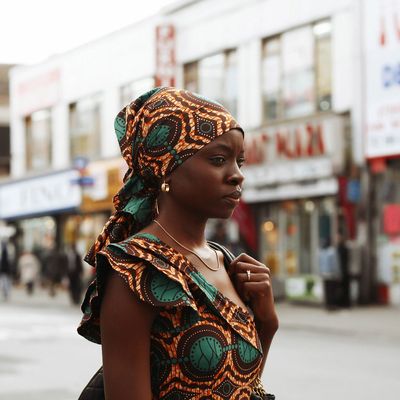
In Mother of George, a Nigerian-American newlywed named Adenike (Danai Gurira) tries vainly to get pregnant with a son, which is not just her desire but, as the title spells out, her destiny. The setting is Brooklyn, Crown Heights, but the Nigerian-born director, Andrew Dosunmu, segments the space: Out this window is modern, secular America; in here it’s Africa, anytime in the last thousand years, where the spirits (orishas) rule. Color is his principal instrument—purple, green, gold, blood red. It’s the purple that reverberates. It glints off the characters’ skin, sculpting their cheekbones, bringing out the masklike quality of their faces. This world is ravishingly beautiful, but there’s also something oppressive about its exoticism. The color doesn’t just saturate the frame; it thickens it. You can’t move fast or with any real freedom in a culture so congealed into ancient ways of seeing. You can’t fully exist if your role is to be the Mother of George and there’s no George forthcoming.
The movie is deeply strange and dislocating. It opens with a pageant, the wedding in traditional garb of Adenike and her older husband, a restaurateur named Ayodele (Isaach De Bankolé). But Dosunmu doesn’t introduce the couple for a bit. He starts with a panorama. Like the late Senegalese master Ousmane Sembene, Dosunmu moves from the outside in—first the community, then the individual. Not that there’s much of what you’d call individualism. When the boisterous ritual ends, the rules are laid down. The matriarch, Ma Ayo (Bukky Ajayi), tells her new daughter-in-law that it’s time to get busy conceiving a son to be named George (for Ayodele’s late father), while a group of men explain to Ayodele that it’s okay to stray as long as he always comes home to sleep—and eat. They make love intensely, solemnly, bathed in purple. Adenike would prefer to work but accedes to the wishes of her husband that she stay home and take care of their son. Who ought to be along anytime now …
The screenplay, by the gifted Brooklyn-based playwright Darci Picoult, reportedly had more dialogue before Dosunmu decided that African men simply wouldn’t talk about their feelings: If Ayodele could talk, it wouldn’t be as hard for Adenike to raise the issue of infertility, much less get her husband to have his sperm tested.
Did Dosunmu remove too much? His way is to make everything oblique, decenter it—move the characters to the side, linger on a sleeve, a patch of skin, a wall. The effect is mostly haunting. Here and there, a touch of clarity would help. I wanted more of the good, funny talk between Ayodele’s agreeably unserious younger brother (Anthony Okungbowa) and his gorgeous nontraditional girlfriend (the magnetic Yaya Alafia, of Lee Daniels’ The Butler), especially on the subject of why he wants to keep their relationship a secret. The cinematographer, Bradford Young, has gotten lots of attention for this film and the dragged-out outlaw melodrama Ain’t Them Bodies Saints: He’s the new go-to guy for directors who “paint with light.” But sometimes you want artistry that doesn’t call so much attention to itself.
Mother of George comes together, though—its ambivalence is shockingly potent. Dosunmu and Picoult love and hate this world. They love the closeness, the interrelatedness, the reverence for the past. They hate the too-closeness, the inbreeding, the overreverence for a patriarchal worldview that has long since ceased to be adaptive. The unexpectedly wily Ma Ayo (such a charming turn by Ajayi) has an outlandish but logical solution to the problem. The pity is that Adenike is unable to live a lie and Ayodele to handle the truth. Watch De Bankolé’s face when he hears the terrible words: A demon enters into him. The soundtrack explodes with cacophonous African pipes and horn blasts, as if the ancient orishas are razzing him. Can he exorcise those spirits enough to see the woman who’s weeping in front of his eyes? If not, does he deserve to be the Father of George?
This review originally appeared in the Sept. 16 issue of New York magazine.


